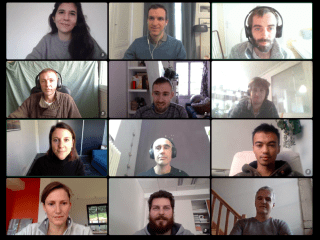The Cocoon Group
Members

Directeur de recherche
CNRS
Tel: 33 04 26 23 44 74

Chargé de recherche
CNRS
Tel: 04 72 43 29 09
Doctorant
UCBL
Tel: 04 72 44 81 42

Directeur de recherche
INRIA
Tel: 33 04 26 23 44 74
Le Cocon is both a research team and a think tank.
Research in “Le Cocon” team focuses on two main topics: multiscale evolution on one hand (i.e., studying the evolution of genetic systems while considering different levels -nucleotides, transposable elements, genes, genomes, microbiomes, organisms, populations, species, geography-), and environmental issues on the other hand. In both cases, we rely on modeling and data analysis, using a combination of statistics and computer science.
Le Cocon is also a place to think about the responsibilities of research and researchers in the anthropocene era, and about the role of non-researcher citizens in orienting and conducting research.
Multiscale evolution
- We have a long history of working on gene transfers. We develop new methods to detect these events in complex systems involving more than two levels (host, symbiont and parasites for example) and
- We use horizontal transfer detection to date species trees and to infer yet unknown biodiversity (extinct and unsampled) (Sthoriz (ANR, 2018)) .
- We have a lasting interest into convergent genomic evolution (Convergenomics - ANR, 2015)
- We question the usual way of testing bioinformatic methods (Evoluthon - ANR, 2019)
- We study the interaction between human populations, their lifestyles, and their gut microbiota (Microregal - ANR, 2015). We are notably interested in identifying cases of host-microbe coevolution and in better understanding transmission dynamics.
Environmental issues
- We develop computational methods to support an agriculture that relies on ecosystemic relationships between crops, the soil, its microbiota, and wild plants and animals (Community Garden Book - Inria, 2019)
- We develop statistical approaches to understand and predict crop yield variability with respect to meteorological conditions
Research in the anthropocene
- We participate to the science shop (UdL), the ethics platform (UdL), Labo1.5, the open science committee, Sciences Citoyennes, the shift project
- We organize a series of seminars to help us think about the position of scientific research in the history of the anthropocene, and about the position of scientists in the future of the anthropocene.
- We assemble committees of citizens to investigate to what extent scientific research can be democratized.
Teaching and outreach
- We teach at University of Lyon, University Lyon 1, INSA, Inria, ENS Lyon, we organize bioinformatics internships
- We regularly participate in the Fête de la Science, have contributed videos in the public transportation system in Lyon, give conferences at Université Populaire and contribute articles in general public journals.
- We develop the software Lifemap to explore the tree of life on computers and smartphones.
Prospective students and postdocs are invited to apply, as we often welcome visitors for internships or research projects.
Publications
Display of 151 to 180 publications on 222 in total
Detecting lateral gene transfers by statistical reconciliation of phylogenetic forests
BMC Bioinformatics . 11 ( 324 ) : 13
Journal article
see the publicationBayesian sampling of genomic rearrangement scenarios via double cut and join.
Bioinformatics . 26 ( 24 ) : 3012-9
Journal article
see the publicationAncestral grass karyotype reconstruction unravels new mechanisms of genome shuffling as a source of plant evolution.
Genome Research . 20 ( 11 ) : 1545-57
Journal article
see the publicationYeast ancestral genome reconstructions: the possibilities of computational methods II.
Journal of Computational Biology . 17 ( 9 ) : 1097-112
Journal article
see the publicationPalaeogenomics of plants: synteny-based modelling of extinct ancestors.
Trends in Plant Science . 15 ( 9 ) : 479-87
Journal article
see the publicationComparative genomics : international workshop, RECOMB-CG 2010, Ottawa, Canada, October 9-11, 2010 : proceedings
International Workshop on Comparative Genomics . 978-3-642-16180-3
Le génome aux ordres des mathématiciens
La Recherche . 439 : 54-56
Journal article
see the publicationThe origin of eukaryotes and their relationship with the Archaea: are we at a phylogenomic impasse?
Nature Reviews Microbiology . 8 ( 10 ) : 743-753
DOI: 10.1038/nrmicro2426
Journal article
see the publicationCassis: detection of genomic rearrangement breakpoints.
Bioinformatics . 26 ( 15 ) : 1897-8
Journal article
see the publicationRECOMB Satellite Workshop on Comparative Genomics
8. Annual RECOMB Satellite Workshop on Comparative Genomics . 978-3-642-16181-0 : 303
Guided genome halving: provably optimal solutions provide good insights into the preduplication ancestral genome of Saccharomyces cerevisiae.
Pacific Symposium on Biocomputing . 15 : 21-30
Conference paper
see the publicationTheory and examples of reciprocal influence between hosts and pathogens, from short-term to long term interactions: coevolution, cospeciation and pathogen speciation following host shifts
Host-Pathogen Interactions: Genetics, Immunology, and Physiology . 978-1608762866
Book chapter
see the publicationGenomes as documents of evolutionary history
Trends in Ecology & Evolution . 1192 : 1-9
Journal article
see the publicationComplete genome of the cellulolytic thermophile Acidothermus cellulolyticus 11B provides insights into its ecophysiological and evolutionary adaptations
Genome Research . ( 19 ) : 1033-1043
Journal article
see the publicationFootprints of Inversions at Present and Past Pseudoautosomal Boundaries in Human Sex Chromosomes
Genome Biology and Evolution . 1(1) : 56-66
Journal article
see the publicationAnalysis of fine-scale mammalian evolutionary breakpoints provides new insight into their relation to genome organisation
BMC Genomics . 10 ( 1 ) : 335
Journal article
see the publicationYeast Ancestral Genome Reconstructions: The Possibilities of Computational Methods
RECOMB International Workshop on Comparative Genomics . 5817 : 1-12
Conference paper
see the publicationComputation of Perfect DCJ Rearrangement Scenarios with Linear and Circular Chromosomes
Journal of Computational Biology . 16 ( 10 ) : 1287-1309
Journal article
see the publicationHybrid sterility and inviability in the parasitic fungal species complex Microbotryum
Journal of Evolutionary Biology . 22 ( 4 ) : 683--698
Journal article
see the publicationPhylogenetic determinants of potential host shifts in fungal pathogens
Journal of Evolutionary Biology . 22 ( 12 ) : 2532--2541
Journal article
see the publicationPrediction of Contiguous Regions in the Amniote Ancestral Genome
ISBRA 2009, 5th International Symposium on Bioinformatics Research and Applications, . 5542
Conference paper
see the publicationMultichromosomal median and halving problems under different genomic distances
BMC Bioinformatics . 10 ( 1 ) : 120
Journal article
see the publicationDatabases of Homologous Gene Families for Comparative Genomics
BMC Bioinformatics . 10 (Suppl.6) :S3 : 13
Journal article
see the publicationExploring the Solution Space of Sorting by Reversals, with Experiments and an Application to Evolution
IEEE/ACM Transactions on Computational Biology and Bioinformatics . 5 ( 3 ) : 348-356
DOI: 10.1109/TCBB.2008.16
Journal article
see the publicationPrecise detection of rearrangement breakpoints in mammalian chromosomes
: 26
Report
see the publicationPrédiction de synténies dans le génome ancestral des amniotes
Journées Ouvertes de Biologie, Informatique et Mathématiques, JOBIM 2008 . : 141-148
Conference paper
see the publicationPerfect DCJ rearrangement
RECOMB-CG: Comparative Genomics . LNCS ( 5267 ) : 158-169
Conference paper
see the publicationAdvances on Stochastic Local Search Algorithms for the Genomic Median Problem
International Conference on Metaheuristics and Nature Inspired Computing (META) . 4872 : 266-276
Conference paper
see the publication
